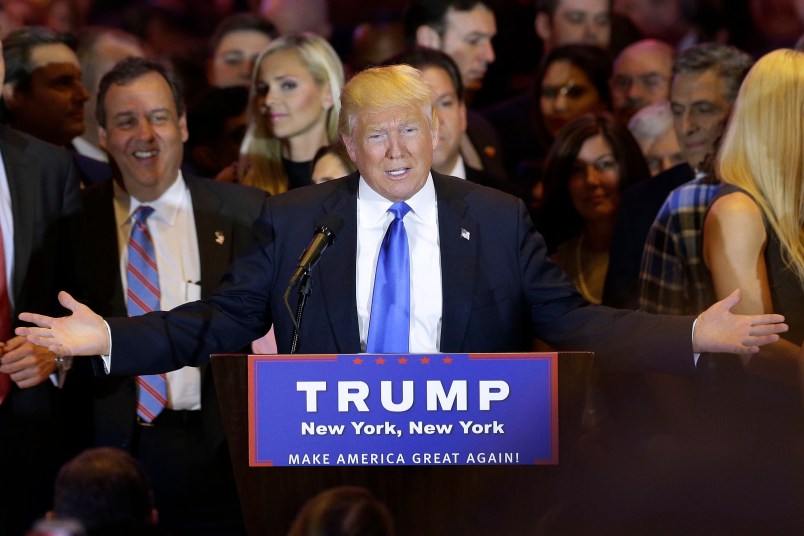It’s been a consistent feature of recent US presidential elections that they are less about persuasion than mobilization of relatively stable political coalitions. There is a thin segment of up-or-grab voters but it tends to be as little as five percent and seldom more than ten percent of electorate, and only those in a handful of swing states really drive the campaigns’ attention. Because of this, the campaigns are largely talking past each; and that is by design.
But watching last night’s victory speeches I realized that this general election is likely to take that model to an entirely new level.
As I mentioned in this post last night, on its own terms, speaking to his own audience, most of Trump’s speech and Q&A were very strong. He was brimming with confidence, on point. His message about bad trade deals and stagnating wages and NAFTA fit together like a nicely ordered package with strong appeal to the people who now actually make up the Republican coalition, as opposed to the people who did in the 1980s. The border wall, while mentioned, had receded to the background. It made me go back to what I started wondering months ago about whether Trump might have significantly more crossover appeal than people realize. Then he came back with the demeaning and crass attacks on Hillary as little more than a gender affirmative action candidate. “Frankly, if Hillary Clinton were a man, I don’t think she’d get 5% of the vote. The only thing she’s got going is the woman’s card.”
When your top surrogate’s Republican wife visibly grimaces at your remark you know it’s bad news for a wide swath of the electorate. Trump can’t not be Trump, a point I want to return to. But for now I want to make a different point.
These two candidates aren’t just appealing to different demographics or voting coalitions. They’re operating in what almost amounts to two different political universes. In linguistic terms it is almost like two mutually unintelligible languages. I guarantee you that everyone who has voted for Trump in any primary so far loved those remarks. They hate Hillary. They hate ‘political correctness’. More than anything else they love provocation itself. But this kind of talk, while a single instance itself, reminds us that Trump has already all but disqualified himself with huge swaths of the electorate. It’s like a long fingernail drag over the chalkboard for a significant majority of voters. Trump has a 70%+ disapproval rating among women; roughly 80% disapproval among Hispanics; and the list goes on and on. At the moment he’s even doing fairly poorly among whites! But we should expect those numbers to rise significantly as Republican partisans unify around Trump.
Meanwhile Clinton is talking about opportunity, inclusion across racial groups and the gender divide. It is a message framed around inclusion for rising groups, young people and incremental improvements in the safety net and wages for those just hanging on in the 21st century economy. It really amounts to a simple continuity message with the Obama presidency. What he did. My point isn’t to pump this agenda. This is an ideologically agnostic point. It is to point out how it is virtually incomprehensible in the Trump universe. Gibberish or nonsense in a worldview based on reclaiming things your supporters believe were or are being taken away from them by others, and a powerful leader reclaiming what you lost from domestic newcomers and foreign adversaries. They’re just categorically different, not just in policy terms, but in language, manner of acting in public, concept of leadership. Everything. They’re mutually incomprehensible, seemingly indifferent to what folks on the other side of the divide even think.
Think about it this way. Can you imagine Trump and Clinton actually debating or discussing a specific issue? Let alone engaging in a formal debate?
What worries Republicans profoundly and has Democrats what I would call cautiously ecstatic is that if both candidates are doubling down on these portions of the population – Clinton’s chunk looks significantly larger than Trump’s. The biggest driver in November may turn out to be gender. But seen through a racial prism, which seems more likely: that Trump will significantly drive up the white vote or that Clinton will significantly drive up the minority vote? Trump seems dramatically less popular with Hispanic voters than Romney and it is difficult to see him making up much of that ground. Remember too that there are fewer white voters in 2016 than there were in 2012.
One of the things Democrats often forget is that demographics only get you so far. They give advantages, sometimes profound advantages. But you still need a politics to win elections. Trump, though, is fencing himself into a demographic playing field that may for once make that important political wisdom meaningless. Unless you manage turnout levels of white men at significantly over 100%, it is very hard to win a national election with just those voters if you make everyone else hate you.








